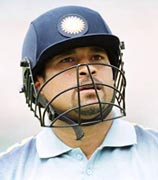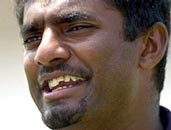What makes a cricketer valuable in ODI cricket?
If he's a batsman he must score a lot of runs, and score these runs quickly.
If he's a bowler he must take a lot of wickets, and concede as few runs as possible.
As a fielder he must take every catch that comes his way, help effect run outs and save as many runs as possible.
The most valuable cricketer must also possess attributes that are harder to quantify. ‘Grit', 'determination ', 'flair ', 'cool ', 'courage' and all those others qualities that commentators love to eulogize.
Let's leave out these ‘hard-to-quantify' variables and attempt a simpler formulation that still seems sensible and interesting.
Let's decide that every run scored fetches a point. So if a batsman scores 60, he gets 60 points. Let's agree that every wicket is worth 20 points. So a bowler who takes 3 wickets also gets 60 points. Finally, let's say that every catch taken is worth 5 points.
Next, we must give more points to a batsman who scores 60 in 60 balls than someone who scores 60 in 100 balls. We must, likewise, reward a bowler who gets 3-25 more than someone who gets 3-55. How could we do this?
The average number of runs scored in ODI cricket is about 225. This is usually scored in 300 balls (50 overs) implying a strike rate of (225/300) x 100 = 75.
So we would normally expect a batsman to score 75 runs in 100 balls. If he gets a century in 100 balls, we offer him 100-75 = 25 bonus points. So these 100 runs fetch him a total of 100+25=125 points. By the same argument we expect a batsman to score 45 runs in 60 balls. If he scores 60 runs, he gets 15 bonus points or a total of 60 + 15 = 75 points. It works the other way if you score slowly. A 60 scored in 100 balls, i.e. 15 runs less, would fetch only 60–15 = 45 points.
Let's consider the bowler's performance now. The batsman's strike rate (SR) is equated with the bowler's economy rate (ER): in effect, a SR of 75 implies an ER of (75/100) x 6 = 4.5 runs per over. Thus, if he bowls 10 overs, he's expected to give away only 45 runs. So a bowler with figures of 10-0-25-3 gets 60 points for the 3 wickets and 20 bonus points -- because he gave away 20 runs less than expected. So this performance will fetch the bowler 60+20 = 80 points. If, instead, the bowler has figures of 10-0-55-3, then he gets 60 points for the 3 wickets but loses 55-45 = 10 points for his poor economy to end up with 60-10 = 50 points.
Notice, in passing, that negative marks are possible. A batsman scoring 30 in 100 balls (he should actually have scored 75 runs) ends up with 30-45 = -15 points. Similarly, a bowler with figures of 6-0-37-0 also ends up with -10 points (he should have only given away 4.5 x 6 = 27 runs, i.e. 10 runs less).
When we worked out this formulation a few weeks ago it looked sufficiently attractive. So we requested the Rediff team to dig into the archives and compile the relevant statistics, over the period January 1st 2001 31st December 2002, for all the 15 x 7 =135 players representing the top nine ODI playing countries.
Our analysis was great fun and contained unexpected surprises.
 We started with Sachin Tendulkar. During 2001 and 2002, Tendulkar played 37 matches and scored a total of 1645 runs in 1837 balls for a strike rate of 89.55 runs per 100 balls. The average strike rate in a 225-run innings is 75. So Tendulkar earned a bonus of 89.55 - 75.00 = 14.55 for every 100 balls faced. We started with Sachin Tendulkar. During 2001 and 2002, Tendulkar played 37 matches and scored a total of 1645 runs in 1837 balls for a strike rate of 89.55 runs per 100 balls. The average strike rate in a 225-run innings is 75. So Tendulkar earned a bonus of 89.55 - 75.00 = 14.55 for every 100 balls faced.
Since he faced a total of 1837 balls, this translated into a total bonus of 14.55 x 1837 = 267.28 points. Tendulkar's total batting points were therefore 1645 + 267.28 = 1912.28. Tendulkar took 7 catches to get 35 fielding points. As a bowler, he took 12 wickets that fetched him 240 points. But his bowling economy rate was poor; he gave away 5.4 runs per over -- instead of the average 4.5 runs -- while bowling his 109 overs and 5 balls. Tendulkar was therefore penalized (5.4-4.5) x 109.83 = 98.85 points. In sum, therefore, Tendulkar's tally after playing 37 matches was 1912.28 + 35 + 240 - 98.85 = 2088.43 points. Tendulkar's average points were therefore 2088.43 / 37 = 56.44. This provides a good indicator of Tendulkar's ‘value' or ‘worth' to his team.  We next looked next at Muthiah Muralitharan, one of the most successful ODI bowlers during 2001-2002. We next looked next at Muthiah Muralitharan, one of the most successful ODI bowlers during 2001-2002.
We found that Murali had played 50 matches, taken 86 wickets, and bowled at an economy rate of 3.15. After a similar calculation (that we won't bother our readers with), we found that Murali's value was 50.62.  Finally we checked out Jacques Kallis, arguably the best all-rounder in ODI cricket today. In 2001 + 2002 Kallis played 52 matches and scored 2052 runs in 2752 balls, at a strike rate of 74.56. Finally we checked out Jacques Kallis, arguably the best all-rounder in ODI cricket today. In 2001 + 2002 Kallis played 52 matches and scored 2052 runs in 2752 balls, at a strike rate of 74.56.
Being a shade below the average 75, Kallis's batting points dropped by a little over 12 to end up with 2039.89. Kallis took 62 wickets but at an economy rate of 4.65, again a little worse than the average of 4.5. So his final bowling points were 1181. He also took 29 catches to earn another 145 points. Kallis finally ended up with a total tally of 3366.29 over 52 matches for a average value of 64.74. |
Kallis' value was 8 points more than Tendulkar's -- confirming what everyone really knows; that an outstanding all-rounder like Jacques Kallis is priceless in ODI cricket and even more valuable than a Tendulkar or a Muralitharan.
Since our values appeared sensible we undertook a similar analysis for all the 135 players from the top nine ODI-playing teams. Our results were extremely revealing, but there was a minor hitch. Certain players like Blackwell and Harmison of England, Blignaut of Zimbabwe or Parthiv Patel of India -- who have so far played too few games for their values to become ‘stable' -- appeared in the top ten. So we decided to consider only those ODI players who have played at least 10 matches for their team in 2001 and 2002. With this correction, we got extremely satisfactory results.
The table below lists ODI's Most Valuable Players (MVPs) from the 2003 World Cup squads (there are some truly valuable players -- e.g. the Waugh brothers -- missing from our list) based upon our allround performance index
| Rank | Name | Index |
| 1 | CH Gayle | 67.92 |
| 2 | JH Kallis | 64.74 |
| 3 | CL Cairns | 64.04 |
| 4 | SR Tendulkar | 56.44 |
| 5 | ST Jayasuriya | 53.24 |
| 6 | Shahid Afridi | 51.73 |
| 7 | M Muralitharan | 50.62 |
| 8 | DS Lehmann | 49.68 |
| 9 | CL Hooper | 48.79 |
| 10 | AC Gilchrist | 48.21 |
| 11 | Salim Elahi | 47.88 |
| 12 | SM Pollock | 47.75 |
| 13 | A Flintoff | 47.56 |
| 14 | V Sehwag | 47.53 |
| 15 | ML Hayden | 47.52 |
| 16 | GW Flower | 46.45 |
| 17 | ME Trescothick | 46.07 |
| 18 | HH Gibbs | 45.49 |
| 19 | RT Ponting | 45.37 |
| 20 | Wasim Akram | 45.33 |
| 21 | SC Ganguly | 44.20 |
| 22 | SE Bond | 43.87 |
| 23 | A Flower | 43.65 |
| 24 | HH Streak | 43.57 |
| 25 | Yousuf Youhana | 43.23 |
| 26 | Abdul Razzaq | 42.59 |
| 27 | SB Styris | 41.67 |
| 28 | RR Sarwan | 41.39 |
| 29 | B Lee | 41.35 |
| 30 | AR Adams | 40.56 |
| Rank | Name | Index |
| 31 | NV Knight | 39.90 |
| 32 | GD McGrath | 39.90 |
| 33 | NJ Astle | 39.23 |
| 34 | MN Samuels | 39.04 |
| 35 | L Klusener | 38.83 |
| 36 | JN Gillespie | 38.70 |
| 37 | N Boje | 38.65 |
| 38 | WPUJ Vaas | 37.46 |
| 39 | VC Drakes | 37.46 |
| 40 | G Kirsten | 36.93 |
| 41 | Harbhajan Singh | 36.52 |
| 42 | JN Rhodes | 36.45 |
| 43 | N Hussain | 36.43 |
| 44 | PT Collins | 36.23 |
| 45 | RC Irani | 36.06 |
| 46 | CZ Harris | 35.84 |
| 47 | AA Donald | 35.83 |
| 48 | CD McMillan | 35.77 |
| 49 | AB Agarkar | 35.73 |
| 50 | KD Mills | 35.32 |
| 51 | BC Lara | 34.87 |
| 52 | SK Warne | 34.69 |
| 53 | M Ntini | 34.00 |
| 54 | M Jayawardene | 33.57 |
| 55 | RS Dravid | 33.17 |
| 56 | Shoaib Akhtar | 33.16 |
| 57 | Saeed Anwar | 33.00 |
| 58 | S Chanderpaul | 32.99 |
| 59 | A Symonds | 32.88 |
| 60 | Waqar Younis | 32.79 |
| Rank | Name | Index |
| 61 | MS Attapattu | 32.63 |
| 62 | Yuvraj Singh | 32.19 |
| 63 | HH Dippenaar | 32.15 |
| 64 | Zaheer Khan | 32.07 |
| 65 | JDP Oram | 31.13 |
| 66 | RP Arnold | 31.06 |
| 67 | Younis Khan | 30.28 |
| 68 | DA Marillier | 29.76 |
| 69 | RL Powell | 29.62 |
| 70 | CD Collymore | 29.57 |
| 71 | AJ Bichel | 29.55 |
| 72 | M Dillon | 29.41 |
| 73 | PD Collingwood | 29.24 |
| 74 | NAM McLean | 29.24 |
| 75 | PA de Silva | 28.73 |
| 76 | Saqlain Mushtaq | 28.70 |
| 77 | D Mongia | 28.57 |
| 78 | A Gunawardene | 28.26 |
| 79 | Inzamam ul Haq | 28.15 |
| 80 | DR Tuffey | 28.02 |
| 81 | MJ Hoggard | 27.64 |
| 82 | DR Martyn | 26.67 |
| 83 | SP Fleming | 26.44 |
| 84 | MG Bevan | 26.41 |
| 85 | J Srinath | 25.93 |
| 86 | SR Watson | 25.86 |
| 87 | AR Caddick | 25.77 |
| 88 | CRD Fernando | 25.20 |
| 89 | M Kaif | 24.69 |
| 90 | CB Wishart | 24.38 |
| Rank | Name | Index |
| 91 | SB Bangar | 24.30 |
| 92 | Mohd Sami | 24.26 |
| 93 | MS Sinclair | 24.09 |
| 94 | AJ Stewart | 24.07 |
| 95 | WW Hinds | 23.86 |
| 96 | DT Hondo | 23.45 |
| 97 | TJ Friend | 23.44 |
| 98 | DL Vettori | 23.39 |
| 99 | TCB Fernando | 23.23 |
| 100 | MV Boucher | 22.18 |
| 101 | KC Sangakkara | 21.66 |
| 102 | Rashid Latif | 21.36 |
| 103 | A Kumble | 21.34 |
| 104 | JP Maher | 21.00 |
| 105 | SM Ervine | 20.77 |
| 106 | A Nehra | 20.62 |
| 107 | AF Giles | 20.43 |
| 108 | PW Gunaratne | 20.19 |
| 109 | RD Jacobs | 19.55 |
| 110 | BA Murphy | 19.17 |
| 111 | MP Vaughan | 18.30 |
| 112 | L Vincent | 17.93 |
| 113 | Azhar Mahmood | 17.21 |
| 114 | HK Olonga | 16.55 |
| 115 | GJ Whittall | 16.05 |
| 116 | DD Ebrahim | 14.83 |
| 117 | RAP Nissanka | 13.85 |
| 118 | BB McCullum | 13.16 |
| 119 | C White | 12.94 |
| 120 | T Taibu | 7.99 |
The biggest surprise was to find Chris Gayle right at the top. He's up there because he scored a lot of runs (1819), scored them at a strike rate of almost 85, took 39 wickets, bowled at an acceptable economy rate (4.86) and also took 22 catches -- and all this in only 42 matches.
There are some other easy conclusions: to make it to the top 10, you must ideally be an excellent all-rounder. You can also make it to the top if you are outstanding in one skill and dabble with some success in the others. If you are excellent in only one skill, expect to be only in the next ten or twenty.
Finally, if we add up the total (not averaged) player tally country-wise, we get the following aggregate score over the 15-man squad that each country is fielding:
| 1 | South Africa | 20395 |
| 2 | Pakistan | 19261 |
| 3 | Sri Lanka | 18714 |
| 4 | India | 18568 |
| 5 | Australia | 16627 |
| 6 | West Indies | 15228 |
| 7 | New Zealand | 14957 |
| 8 | Zimbabwe | 10935 |
| 9 | England | 9390 |
South Africa are at the top because they have the best collection of all-rounders. Pakistan are second because they have the second best set of all-rounders. Sri Lanka and India have among the most talented individual players.
The real surprise is Australia at No. 5. It is easy to see that this is because the Waugh brothers are absent and are being replaced by relatively inexperienced players like Martyn and Maher; together, the Waughs would have contributed at least 3000 points more to the tally -- putting them right at the top! Australia, not to mention World Cup viewers, are going to miss them sorely.